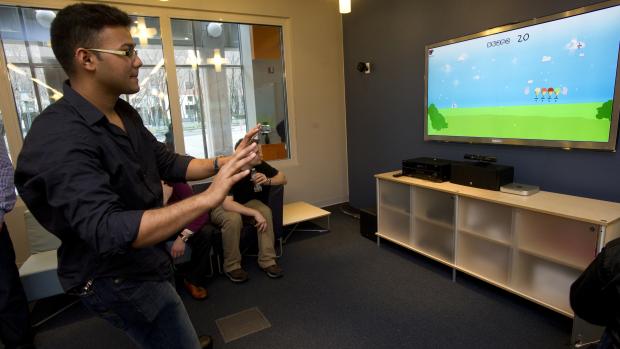NYU-Poly Named Top Place to Study Video Game Design

Students aspiring to create the next blockbuster video game get an extra boost at Polytechnic Institute of New York University (NYU-Poly) and New York University, according to the Princeton Review. Both were named as top places to study video game design in the Review’s 2011-2012 survey of 150 institutions offering undergraduate and graduate coursework and degrees in the United States and Canada.
“We have an engineering and computer science focus at NYU-Poly, which allows students to go  deeper into the programming and hardware side of games than they can at other schools,” explained Katherine Isbister, director of NYU-Poly’s Game Innovation Lab and associate professor of computer science and engineering. NYU-Poly’s state-of-the-art Game Innovation Lab and its user-research facility are just two components in a richly integrated ecosystem NYU-Poly and NYU have created for students to get theoretical and practical experience designing games.
deeper into the programming and hardware side of games than they can at other schools,” explained Katherine Isbister, director of NYU-Poly’s Game Innovation Lab and associate professor of computer science and engineering. NYU-Poly’s state-of-the-art Game Innovation Lab and its user-research facility are just two components in a richly integrated ecosystem NYU-Poly and NYU have created for students to get theoretical and practical experience designing games.
NYU already offers undergraduate and graduate courses, concentrations, and degrees that prepare students for careers in the more than $10.5 billion video game industry, but beginning in the fall of 2012, the NYU Game Center will begin to offer a Master of Fine Arts degree in game design. The program is unique because it looks at gaming across a variety of media, including consoles, PCs, smartphones and social networks.
“Games are the defining cultural form of this century and the NYU Game Center MFA is dedicated to exploring their potential,” says Director Frank Lantz. “There are places to study the technical and business aspects of games, but the Game Center MFA has a unique creative focus on games for today’s platforms.”
As gaming takes a larger chunk of the media and entertainment market —the entertainment software industry’s annual growth rate from 2005 to 2009 was more than 10 percent according to the Entertainment Software Association— it also benefits gaming students to be in the media capital of New York City.
“New York City itself has a thriving community of independent game developers and companies small and large, where students can intern, and from whom we have frequent invited lectures to encourage real-world problem solving and innovation among the students,” says Isbister.
The Princeton Review asked administrators 50 questions, covering topics from academics and faculty credentials to graduates' employment and career achievements, in its survey. Criteria for selections included the quality of the curriculum, faculty, facilities, and infrastructure. The survey also factored in data on scholarships, financial aid, and career opportunities.




